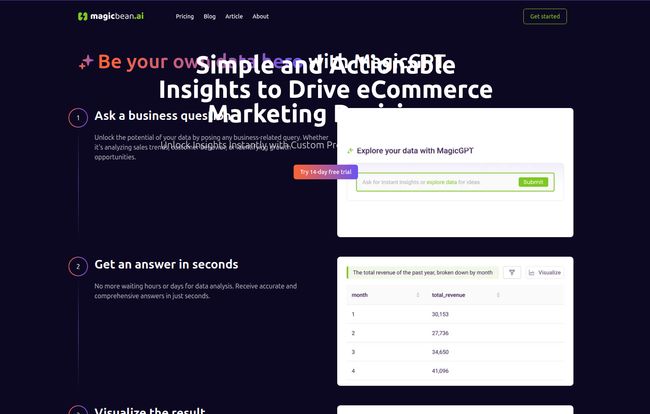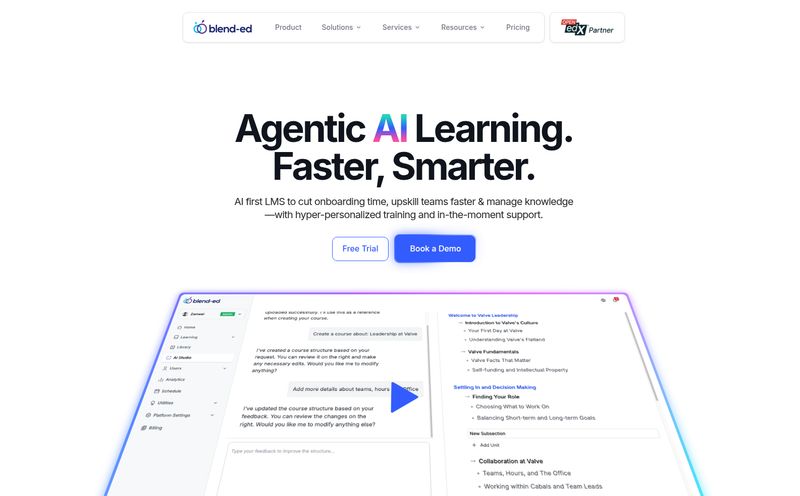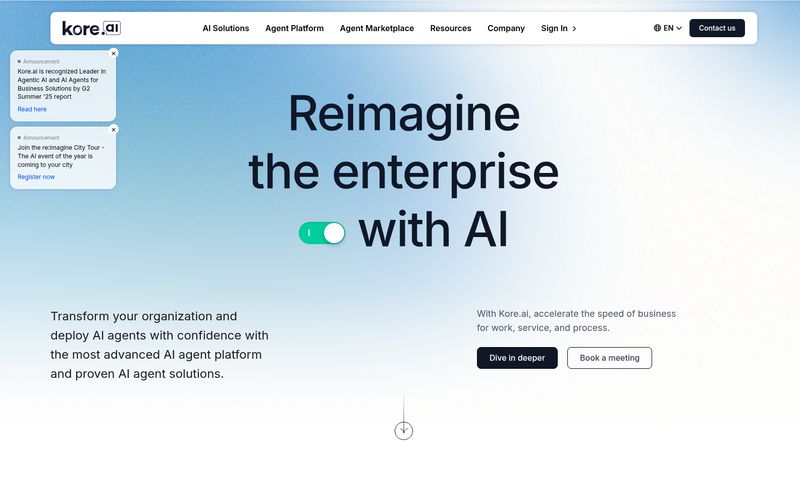If you’re running an eCommerce store, you’re swimming in data. Drowning in it, more like. You’ve got Shopify analytics giving you the basics, Google Analytics throwing more charts at you than you can shake a stick at, and then there’s the data from your email platform, your ad accounts... it's a lot. For years, the answer has been to either hire a data analyst (expensive!) or spend your weekends neck-deep in spreadsheets, trying to make sense of it all. We've all been there, squinting at VLOOKUP formulas at 2 AM.
But the wind is changing. AI is the buzzword on everyone’s lips, and it's promising to be the great translator—the thing that finally turns all that raw data into plain English advice. I’ve seen a dozen tools pop up claiming to do just that. So when I started hearing chatter about a platform called MagicBean.ai, my curiosity was piqued. Is it just another shiny object, or is it the real deal? I decided to take a look under the hood.
So, What is MagicBean, Really?
Forget the corporate jargon for a minute. At its core, MagicBean is like having a data analyst on retainer, ready to answer your questions instantly. Instead of you digging for insights, you just… ask. It’s an AI-powered analytics platform built specifically for the chaos of eCommerce. It plugs directly into your most important tools (we’ll get to that) and lets you query your own business data using natural language.
Think of it less as a dashboard and more as a conversation. You’re not just looking at a graph of your sales. You’re asking, “Which of my marketing campaigns brought in customers with the highest lifetime value?” and getting a straight answer. Its entire reason for being is to help you improve that one metric that truly matters for long-term success: Customer Lifetime Value (CLV). Because repeat customers, not one-off sales, are what build an empire.

Visit MagicBean
The MagicBean Experience: From Question to Action
The workflow is refreshingly simple. So simple, it feels a bit like magic at first. The platform basically operates on a three-step rhythm: Ask, Visualize, and Act.
First, you ask a question. And I mean a real question, like one you’d ask a colleague. Something like, “What was the total number of the past years orders broken down by month?” or “Show me the repeat purchase rate for customers who bought Product X first.” This is the AI prompt system, and it’s the heart of the whole operation.
Within seconds, MagicBean crunches the numbers and gives you an answer, usually with a clean, easy-to-read chart or graph. No fuss. No confusing configuration menus. It just presents the findings. For those of us who aren't sure what to ask, they’ve built in a library of ready-to-use templates for common eCommerce reports. It's a great starting point that can help you uncover blind spots you didn’t even know you had.
Diving into the Features that Matter
A tool is only as good as its features, right? Here’s what stood out to me.
The Shopify and Klaviyo Integration is a Game-Changer
This is, in my opinion, its killer feature. MagicBean integrates directly with Shopify and Klaviyo. Why is this so massive? Because it connects your point-of-sale data with your primary marketing communication channel. You can finally see a clear line between an email campaign you sent and the long-term value of the customers it brought in. No more exporting CSV files to try and stitch that story together manually. It centralizes the two most important data sources for most DTC brands.
AI Prompts vs. Templates
You get two ways to play. The custom AI prompts give you incredible flexibility. If you can think of the question, you can probably ask it. This is for the marketing manager who wakes up at 3 AM with a sudden hypothesis they need to test. But let’s be real, there's a small learning curve. You have to learn how to ‘talk’ to the AI to get the best results. The templates, on the other hand, are your shortcut. They cover things like customer cohort analysis, product performance, and marketing attribution. A perfect way to get value from day one.
Let's Talk Money: The Pricing Breakdown
Alright, the all-important question: what’s this going to cost? The pricing structure seems pretty well thought out for different stages of a business. And they offer a 14-day free trial, which is always a good sign.
| Plan | Price (Monthly) | Key Features | My Take |
|---|---|---|---|
| STARTER | $16 /mo | 1 User, Up to 1000 orders/month, Email support | A total no-brainer for a solo founder or a small store just finding its footing. The price of a few fancy coffees for real insights. |
| PRO | $66 /mo | Up to 5 users, Up to 3000 orders/month, Priority email support | This feels like the sweet spot. Perfect for a growing brand with a small marketing team that needs to collaborate. |
| PLATINUM | $166 /mo | Unlimited Users, Unlimited Orders, Chat and email support | For the established players and agencies. If you're doing serious volume, this plan scales with you without penalty. |
They also offer a 13% discount if you pay annually, which is worth considering if you decide it's a fit after the trial.
The Good, The Bad, and The Data-Reliant
No tool is perfect. After digging in, here's my honest take on the highs and lows.
The good stuff is obvious. It’s fast, the integrations are smart, and it’s laser-focused on providing actionable insights, not just more data points. The ability to customize reports without being a developer is a huge win.
On the flip side, there are a few things to keep in mind. The first is a classic principle of any data tool: garbage in, garbage out. MagicBean is powerful, but it can only analyze the data you give it. If your product tagging in Shopify is a mess or your Klaviyo segments are poorly maintained, the insights will be skewed. This tool won't clean your data for you; it just analyzes it. So, a bit of housekeeping might be in order first.
Secondly, while the pricing is reasonable, the Starter plan's 1,000-order limit might be outgrown quickly by an ambitious store. And as I mentioned, getting the most out of the custom prompts requires a bit of experimentation. It's a skill you develop.
Who is MagicBean For (And Who Should Maybe Pass)?
So, who should sign up for that free trial right now?
- Growth-focused Shopify stores who feel they've hit the ceiling of what basic analytics can tell them.
- Marketing managers who live in Klaviyo and want to directly tie their efforts to revenue and CLV.
- Business owners who are data-curious but don't have the time or expertise to become full-blown analysts.
And who might want to hold off? If you're not on Shopify or Klaviyo, it's obviously not for you right now. If your store is brand new with very little data, you might want to wait until you have a bit more history to analyze. And if your internal data is an absolute disaster, maybe tackle that fire first.
Frequently Asked Questions
What is MagicBean and how does it work?
MagicBean is an AI-powered analytics tool for eCommerce businesses. It connects to your Shopify and Klaviyo accounts and lets you ask plain-English questions about your business data (like sales trends, customer behavior, and marketing effectiveness) to get quick, visual answers and reports.
Who can benefit most from using MagicBean?
eCommerce stores, particularly those on the Shopify platform, that want to go beyond basic reporting to understand and increase customer lifetime value (CLV). It's great for marketers and founders who want data-driven answers without needing to be data scientists.
What kind of support is available if I run into issues?
Support depends on your plan. The Starter plan comes with email support, the Pro plan gets you priority email support, and the Platinum plan includes both chat and email support for the quickest response times.
Is my store's data secure with MagicBean?
Like any reputable SaaS platform, MagicBean takes data security seriously. They use secure connections to integrate with your platforms and follow industry best practices to ensure your customer and sales data is protected. It's always good practice to review the privacy policy of any tool you connect to your store.
Is there a free trial to test it out?
Yes, MagicBean offers a 14-day free trial on all of its plans. This gives you two weeks to connect your store, play with the features, and see if you get real value from it before committing.
Do I need to be a data expert to use it?
Not at all. That's kind of the whole point. While a data expert could certainly do some powerful things with the custom prompts, the platform is designed with pre-built templates and a natural language interface so that anyone can start getting valuable insights right away.
My Final Take: Is It Worth It?
Here's the bottom line. In an industry flooded with complex tools, MagicBean’s focus on simplicity and action is incredibly refreshing. It successfully bridges the gap between the limited native analytics of eCommerce platforms and the overwhelming complexity (and cost) of enterprise-level business intelligence software.
It’s not a silver bullet—you still need to have a decent data foundation and a curiosity to ask the right questions. But for the right store, this tool could absolutely be a catalyst for smarter growth. It turns hindsight into foresight. And in the competitive world of eCommerce, that might just be the most valuable magic trick of all.
Reference and Sources
- MagicBean Official Website
- MagicBean Pricing Page
- Understanding Customer Lifetime Value (Shopify Blog)



